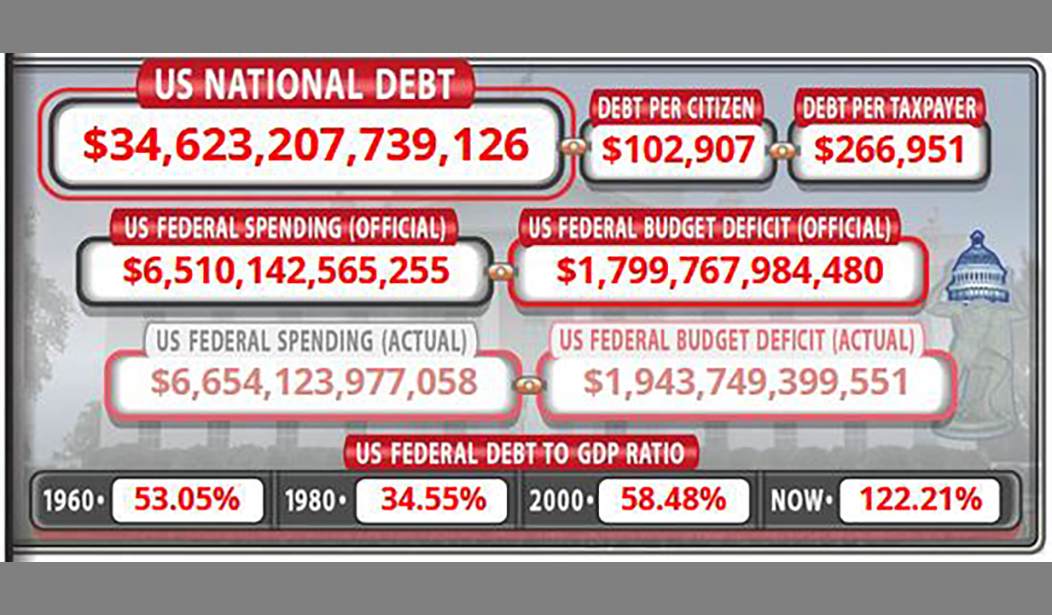A quick look at our national debt, handily tracked and presented by the U.S. National Debt Clock, tells us one undeniable fact--one that the Bloomberg organization has confirmed: We are hosed.
The United States is almost certainly on an unsustainable path with regard to the astronomic rise in its national debt, according to a million simulations run by Bloomberg.
Bloomberg reported Tuesday that it conducted a million simulations on the U.S. debt outlook and found 88% of them show borrowing is on an "unsustainable path."
The findings come after a forecast by the Congressional Budget Office that indicates the national debt will grow to an astonishing $54 trillion in the next decade, the result of an aging population and rising federal health care costs. Higher interest rates are also compounding the pain of higher debt.
Payments are expected to triple from nearly $475 billion in fiscal year 2022 to a stunning $1.4 trillion in 2032. By 2053, the interest payments are projected to surge to $5.4 trillion. To put that into perspective, that will be more than the U.S. spends on Social Security, Medicare, Medicaid and all other mandatory and discretionary spending programs.
In 2032 I'll be 71; in 2053 I'll be 92. We Boomers aren't going to be hit by the worst of this, although if you look at Boomer voting patterns, my generation sure carried a big load of the responsibility for this.
But wait! There's more!
When factoring in the market's current outlook on interest rates, the debt-to-GDP ratio is expected to rise to 123% in 2034, according to Bloomberg. But that's a fairly optimistic outlook, given the assumption in Washington that the sweeping tax law passed in 2017 by former President Trump will likely be extended once certain provisions expire in 2025.
In a "higher simulation" scenario, the debt-to-GDP burden could be as high as 133.9% in 2034 and 185% in 2050, the report shows.
Meanwhile, despite a few conservative/libertarian voices calling out in the wilderness, Congress just keeps spending, and spending, and spending.
See Related: BREAKING: Senate Passes $1.2 Trillion Budget Package, Blocks Inclusion of Laken Riley Act
Rep. Chip Roy Shreds Republican Leadership As 'Total Failure' Over Bloated Omnibus Spending Package
There are three ways out of this mess.
First, we can shrink our way out of it. Cut everything from the federal government that isn't specifically authorized as an enumerated power in the Constitution and we would be a long way towards achieving that goal. This would at least be a good start, although it's not at all clear whether this would be enough - not anymore. And let's face it, Congress won't do this; how can they hold on to their phony-baloney jobs without the ability to promise an ever-increasing gravy train of free stuff?
Second, we can grow our way out of it. That seems unlikely, as for quite a while now, the federal government has consistently pursued anti-growth policies, instead of one sure-fire growth-oriented policy: Staying out of the damn way. That's equally unlikely; it is in the nature of government to grow ever larger and more intrusive, and it's hard to see that reversing any time soon.
Third, we can inflate our way out of it, paying off this unsustainable debt with worthless fiat currency during a round of Zimbabwe-style inflation. This won't help either; no matter how we inflate the currency, we can always count on government spending to stay ahead of it, unlike our paychecks.
We have mortgaged our children's and grandchildren's futures--and history will rightly condemn us for it.














Join the conversation as a VIP Member